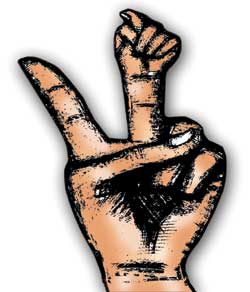 Lille, France - This is not a junket by any standard. Being confined to smoke-filled rooms for close to 18 hours a day discussing abstract ideas is no vacation. And when you consider that vegetarian French food is absolutely terrible, the fact that I do not drink becomes a definite disadvantage. Despite this, though, I am glad that my first peep into the western world is through the French window.
Lille, France - This is not a junket by any standard. Being confined to smoke-filled rooms for close to 18 hours a day discussing abstract ideas is no vacation. And when you consider that vegetarian French food is absolutely terrible, the fact that I do not drink becomes a definite disadvantage. Despite this, though, I am glad that my first peep into the western world is through the French window. Apart from their aquiline, almost parrot-like noses, Nepali Bahuns and academics from the North of France have one other thing in common-their love for ideas that transcend time and space. They do not let considerations of pragmatism restrict them to the "done" ways of doing things. Perhaps it is for this rason that the seeds of the French Revolution were first sown here-in the coal mines of northern France.
Like the coal mine we visited in Arenburg, or the remains of a once-flourishing steel industry in the ghost town of Denain, almost all this region's smoke-stack industries are now closed. The French find it is cheaper to import coal and steel from Africa and Asia than to produce either here. In any case, close to 75 percent of electricity consumed in France comes from their own nuclear power plants.
But remarkably, even such large-scale closure of factories has not destabilised the job market. That is because the city of Lille invested in culture-a university, art galleries, museums, theatre and the like. That gave a fillip to tourism and created more jobs in the service industries than were lost through the closure of the various mines and factories. As a result, this region has a cultured and cosmopolitan ambience and on weekends fills up with visitors from the cold country across the Channel. People boast proudly that the South of France may have better weather, but the smiles on Gallic faces along the Belgian border are sunnier.
The ideas we are exploring in seminar halls are so far from the grim realities of our daily lives that they are either visionary or plain nuts. How many of us, for instance, are ready to believe that we can change the orientation of our nation-states from "national security commitments" to "human security consciousness"? In functional terms, that shift would mean that nation states would start disbanding their military forces and setting up armies of teachers, health workers, artisans, singers, artistes, writers, poets and philosophers. A dream no doubt, but one worth having. The prelude to all great transformations is a dream.
Our main preoccupation at all the sessions has been trying to come up with ways and means to resolve conflicts. Nation-states are agents of conflict, as are organised religion and obsessive individualism. But these are all harsh facts of modern life. We cannot wish them away, we can only do the next best thing-reform existing institutions or set up new ones that engage with and mediate between conflicting agents to work for the least unacceptable terms of conflict resolution.
The state as a large whole itself needs to be reformed, its institutions need to concentrate on facilitating and enabling, rather than controlling and regulating. This requires an important change: focusing not only on popular democracy, but on functional democracy. We all know the democracy we have been practising all these years has not been functioning optimally, yet we keep repeating the stale apologia of Winston Churchill that "nothing better has been devised". It is time we moved away from that and tried to conceive of something new, something better, that we can put into practice. How long can our academics and thinkers continue to hide their intellectual lethargy behind the so-called "liberal" hedge of "western domination"? If they do not hurry, there are other Khomeinis and Osamas waiting in the wings to cash in on the popular dissatisfaction with western values.
The need to reform religions is no less pressing. After all, religion is politics with cold deities or dead prophets as leaders. It might be desirable to simply abolish religion, but that, too, is unlikely to happen anytime soon. So the only option for us is to have platform for inter-faith dialogues, and inter-religious parliaments where criticism is not considered heresy. Unless liberal clerics themselves take the lead in initiating such changes, their own more obscurantist colleagues will make them irrelevant. Swami Agnivesh from India brought home this point so forcefully that silence, and not applause, greeted his talk.
The most daunting task is transforming individuals from being consumers obsessed with their own rights, to global citizens aware of their responsibilities towards the world, and the diversity of cultures and species that make it. It is very difficult to wean individuals away from juvenile ideas of patriotism and make them grow into citizens of the world conscious of the common suffering of all humanity. But it is not such a new idea. It dates back to "Vasudaiva Kutumbkam"-the planet is one family.
In the end, that is what really matters. The political lines drawn on maps are arbitrary. The sky, the air, the water, birds and bees and the curses and boons of nature do not recognise human boundaries. We have drawn those lines, and we can certainly erase them from our consciousness.
Very abstract ideas, these. And more powerful when imbibed in the company of people who do not need to understand your language in order to understand you.



